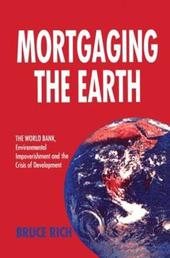
|
Mortgaging the Earth: World Bank, Environmental Impoverishment and the Crisis of Development
Paperback
Main Details
| Title |
Mortgaging the Earth: World Bank, Environmental Impoverishment and the Crisis of Development
|
| Authors and Contributors |
By (author) Bruce Rich
|
| Physical Properties |
| Format:Paperback | | Pages:388 | | Dimensions(mm): Height 234,Width 156 |
|
| Category/Genre | Development economics
Banking |
|---|
| ISBN/Barcode |
9781853832215
|
| Classifications | Dewey:332.1532091724 |
|---|
| Audience | | Undergraduate | | Postgraduate, Research & Scholarly | | Professional & Vocational | |
|---|
|
Publishing Details |
| Publisher |
Taylor & Francis Ltd
|
| Imprint |
Earthscan Ltd
|
| Publication Date |
30 April 1994 |
| Publication Country |
United Kingdom
|
Description
This critique of World Bank operations examines the effects of this organization on the societies in which it operates. Highly critical of the Bank's practices in its 50 years of operation, the author demonstrates how the Bank has become virtually unaccountable and a law unto itself. He describes how the Bank has supported oppressive regimes and loaned money to support large projects which have displaced local populations. He argues further that the Bank's current policies of structural adjustment are arresting the development of Third World countries.
Reviews"as credible as it is shocking" Los Angeles Times Kirkus Review US:The international Bank for Reconstruction & Development (aka the World Bank) turns 50 in 1994. On the evidence of the damning, one-sided tract here, Environmental Defense Fund attorney Rich won't be invited to any parties that might be held. Drawing on a variety of sources (including documents leaked by insiders), the author delivers a harsh critique of the WB and virtually all its works. Since inception, he says, the multilateral institution has been party to a quietly destructive "war against the diversity of humankind's cultures and our planet's biological inheritance." In aid of this apocalyptic thesis, Rich reviews bank-backed infrastructure enterprises in the Amazon rain forest, rural India, Thailand, and other Third World venues, which, he alleges, have not only wreaked ecological havoc but also displaced multitudes of indigenous peoples. At the end, the author likens the WB to Goethe's Faust, who (though blinded by a vengeful Care) continued to direct what he believed was a reclamation project but which proved to be his own grave. In probing why the WB became a raging bull in the Global Village's backcountry china shops, Rich cites anecdotal evidence of an arrogant, largely unaccountable bureaucracy that operates in compulsive secrecy and remains stubbornly dedicated to what he views as an arguable proposition - i.e., that economic growth is a panacea for most if not all of modern society's ills. As far as the author is concerned, however, the price of progress a la the WB is far too high, and he calls for radical reforms that will either make the institution more responsive to grassroots wishes or halt its funding altogether. At no point does Rich make a systematic effort to report on whether any earthly good has ever come from a World Bank loan - an omission that inevitably undermines the credibility of a heartfelt polemic informed by an abiding distrust of development capitalism and its putatively injurious consequences. (Kirkus Reviews)
|